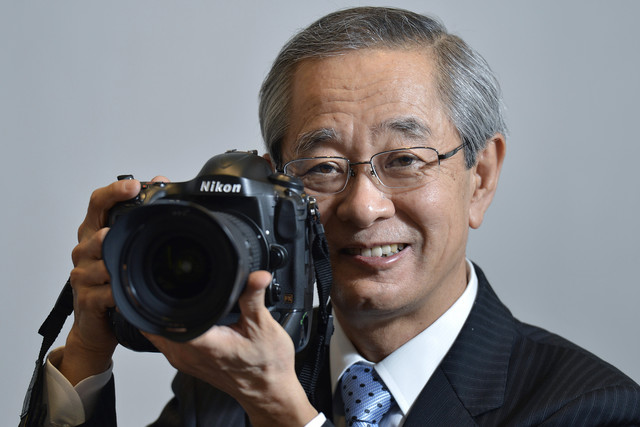Nikon's Mystery Device Could Be a Smartphone
At one point, Nikon was at the top of the point-and-shoot camera market. But like many of its competitors, Nikon has taken a hit in the wallet thanks to the rise in smartphone use. Customers no longer need to carry a bulky camera around their neck, but instead can whip out a smartphone packing high-resolution camera sensors. And it's only going to get worse for the traditional camera maker.
In a July 4 interview at Nikon’s Tokyo headquarters, President Makoto Kimura told Bloomberg that point-and-shoot camera sales across the industry have dropped about a quarter in April and May from a year earlier. Meanwhile, smartphone shipments jumped up 46 percent last year to 722 million units. Obviously Nikon needs to change its direction in the general consumer market at the very least.
"The number of people taking snapshots is exploding by use of smartphones that sold 750 million or so last year and are still growing," Kimura said. "We’ve centralized our ideas around cameras but can change our approach to offer products to that bigger market."
The company's high-end camera portfolio with exchangeable lenses, like the D4-SLR costing $6,000, is expected to gain 9 percent in the current financial year. However it's the company's consumer-focused compact point-and-shoot business that's taking a hit, and this portion of the market is expected to shrink 12 percent in the same financial year. Kimura said sales of the higher end models will help compensate for the lack of sales in the point-and-shoot division for a few more years.
Meanwhile, Nikon's imaging division and a new business team are developing new products that should become available in less than five years. Kimura said Nikon is looking to create a product line that will change the concept of cameras, and could even be a non-camera consumer product. Naturally he wouldn't elaborate any further.
Does that mean Nikon may be developing a smartphone? The president declined to say, only stating that a rapid expansion of mobile devices is a change in business environment given to Nikon. "Our task going forward is to find an answer to that change," he said.
The company may also expand into production of medical devices, following Canon Inc. and Sony Corp. Rival camera maker Olympus Corp. is already the world's largest maker of endoscopes, a device with a light attached that's used to look inside a body cavity or organ. Ouch.
Get Tom's Hardware's best news and in-depth reviews, straight to your inbox.

Kevin Parrish has over a decade of experience as a writer, editor, and product tester. His work focused on computer hardware, networking equipment, smartphones, tablets, gaming consoles, and other internet-connected devices. His work has appeared in Tom's Hardware, Tom's Guide, Maximum PC, Digital Trends, Android Authority, How-To Geek, Lifewire, and others.
-
dalethepcman "change the concept of cameras, and could even be a non-camera consumer product"Reply
I know, lets make a pair of glasses that users can interact with by talking to them, view the web on, and take pictures/video with. -
djfv Well, good companies should follow market changes.Reply
Kodak didn't transition to digital photography quickly enough, unlike Nikon, and therefore - it went bankrupt.
There is a new change in the photography world, and this time it is caused by smartphones. We will see how traditional photo companies will fare. -
pbrigido I've been shooting Nikon FX DSLRs for years, and there is no way I would trade out my gear for a camera phone. Some phones out there take good pictures, but until the sensor size equals what is in my D800 (which won't happen), image quality will never be as good as a full frame camera.Reply -
JPNpower Reply11125201 said:I've been shooting Nikon FX DSLRs for years, and there is no way I would trade out my gear for a camera phone. Some phones out there take good pictures, but until the sensor size equals what is in my D800 (which won't happen), image quality will never be as good as a full frame camera.
You don't understand. Your full frame camera is going nowhere. This is how Nikon needs to survive to be able to keep selling awesome cameras. -
JPNpower Come to think of it. Nikon's competitors have great products to help their camera department when the market fluctuates. (Sony TVs, Canon printers). Nikon needs some kind of buffer too.Reply -
__-_-_-__ nikon 1 was really great. a product with lower specs then the competition at the same price. keep it this way. also don't forget not to add gps and wifi like real modern cameras have.Reply -
JPNpower GPS on cameras is epic, and one of the greatest things that happened to digital images. Wifi... is a waste of batteryReply -
mman74 Horses for courses.Reply
If I am in a bar for example and don't have a camera with me and want to take some snaps, I use my smartphone.
If I am on a day out, say a hike and don't want to carry a bulky camera I take my point and shoot with me.
If I am going to an important event and need good pictures say a graduation ceremony, a school play etc, then I'll bring my DSLR and lenses.
Personally I think I need all 3 cameras, but I can understand why people work with just their smartphone, or smartphone plus DSLR and never buy a point and shoot. -
okibrian "Customers no longer need to carry a bulky camera around their neck"Reply
The bulky cameras are most of the time dSLR cameras and in no way can a, "smartphone packing high-resolution" replace it. It can however replace most point and shoot cameras. -
Marcus52 I find the idea of a Nikon smart phone intriguing. On the other hand, Nikon doesn't mean to me what it used to when their only product was high-end cameras.Reply
